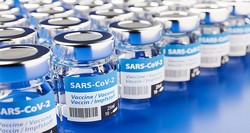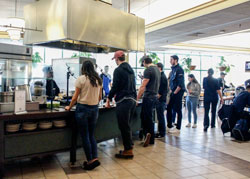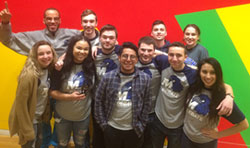Monmouth University health officials have encouraged students and faculty to receive the COVID-19 vaccination as it becomes available in order to return to normal campus life.
“College students should seriously consider getting vaccinated,” said Director of Health Services Kathy Maloney. “This is not just for one’s own health but for the health and well-being of family members, friends, and the greater community. Vaccination is our primary defense against the COVID virus. If we can eliminate people serving as hosts for viral replication, we can reduce case incidence on campus and in the community.”
About 39 million doses have been administered in the United States, surpassing the approximate 26 million positive cases as reported by the Centers for Disease Control and Prevention (CDC)’s COVID-19 Data Tracker. The CDC also stated that about 59 million doses have been delivered. As for progression, the latest rate of administered shots was reported as 4.69 million doses a day, according to the Bloomberg Vaccine Tracker.
“The vaccination effort in this country got off to a slow start but it is picking up steam,” said Maloney. “It was difficult in the beginning when supplies were limited and demand was great. This required health agencies to establish a priority order for distribution. We still have more demand than supplies. However, as more vaccines become available and the number of distribution centers increase, we will be able to vaccinate anyone seeking the vaccine. I strongly encourage all members of our campus community to get vaccinated once it becomes available to them.” Maloney received both doses of the Moderna vaccine.
The Pfizer-BioNTech and Moderna COVID-19 vaccines are the vaccine options currently available and authorized by the U.S. Food and Drug Administration (FDA). Because they are both mRNA vaccines, they function in the same way. Both include lipids, which create a greasy outside pocket to contain the mRNA and allow it to get inside the immune cells.
“The mRNA vaccine is very simple. Just a piece of RNA that will produce an immune response to create antibodies,” said Danuta Szwajkajzer, Ph.D., a Senior Lecturer in the Department of Chemistry and Physics and a biophysical chemist by training, who has worked on proteins and DNA interactions for many years. She has already received her first shot for the COVID-19 vaccine and is waiting for her second one.
Although the mRNA vaccines are new in treating COVID-19, mRNA vaccines have been undergoing study for years in relation to cancer-based research. Both vaccines have been reported through clinical trial data being about 95 percent effective at preventing the COVID illness when both shots are taken. However, it is still unclear to what extent the vaccines will prevent contraction and transmission of the virus. It is known that those vaccinated have been protected for at least 4 months.
As stated by the CDC, the vaccines will not cause a positive COVID-19 test since the vaccines do not use the live virus that cause COVID-19.
Both vaccines result in similar side effects including tiredness, headaches, muscle and join pain, chills, and fever. A rare effect observed was the development of Bell’s palsy (temporary facial paralysis) for four of the 30,000 participants in the Moderna clinical trial and four of 43,000 participants in the Pfizer clinical trial. The exact cause and/or tie to the vaccine is unknown; however, the conditions are reported to be benign and mild where the patients recover in several weeks.
Despite these side effects and possible risks, Haider Husaini, a freshman business student, supports the vaccine due to the worse long-term consequences associated with recovery from COVID-19. “I think college students should get the vaccine not only to protect themselves in the present, but also in the future,” said Husaini, who learned about mRNA through his drug sciences course last semester.
Husaini continued, “Whether you are symptomatic or asymptomatic, the long-lasting effects are the cause of a wide array of problems in the long run. The lung damage that the virus inflicts on a cleared COVID patient is worse than that of a long-time smoker. I think people among our age group need to consider the toll the virus takes on a person, young or old.”
Moderna is eligible for those at least 18 years old, whereas Pfizer-BioNTech is allowed for people at least 16 years old. This age difference is dependent on the clinical trials done by each company which determined what age was suitable for a safe vaccination. The immune systems of younger individuals process differently and may require alternate dosage amounts, which is why the age regulations exist for safety purposes. However, considering the vaccination priority consists of healthcare workers, essential workers, and those that are 65 and older, the age requirements may not have much significance as of now.
“It would be great if we all get vaccinated,” said Szwajkajzer. “This would produce a herd immunity and the virus will be eradicated. This will allow to get back to the past ‘normal’. It is much harder to teach via Zoom. Students need structure and focus to be motivated. Let’s think about all in-person classes, labs, meetings, trips, parties etc. all without masks and social distancing. I miss seeing faces of my students. The human interactions are essential for learning.”
“I think that the vaccine is only one step in a full return to campus. The COVID vaccine, like every vaccine created, does not make anyone completely immune. I urge every student to wear a mask, specifically a surgical mask or an N-95 mask. This is because the new variants can penetrate the cloth masks. I also suggest not going out unnecessarily. A large reason as to why this virus’ reign has extended is because people attend large gatherings,” said Husaini.
Returning to normalcy is a future that many Monmouth individuals hope to see.
“Once vaccination begins for college students, you will see the number of cases on college campuses decline. As state-wide cases decline, there will be loosening of restrictions by state governments. For colleges this would herald the beginning to having more in person classes, larger group activities, spectator sports, study abroad opportunities, and social gatherings. We need a robust vaccination effort from every member of our community in order to achieve herd immunity. We need herd immunity in order to return to a sense of normalcy,” said Maloney.
Sonya Alfano, a senior chemistry student, hopes for the same outlook. “I believe college students should get the vaccine because college students are in enclosed spaces together in some cases, large quantities,” Alfano said. “Monmouth has done a really good job of limiting capacity on rooms and spacing everyone out, but the more that are vaccinated, the closer we are to being able to go back to some level of normalcy, hopefully.” Alfano has received both doses of the vaccine.
William Schreiber Ph.D., Chair of the Department of Chemistry and Physics, has an equal desire towards normalcy, but with some safeguard. “I am hopeful that vaccination, and continued precautions, will enable us to return to normal operations by the fall semester, and perhaps, to some extent, over the summer,” he said. “However, we have a long way to go in terms of vaccine availability and distribution for that to happen. Those things can’t be predicted with any certainty right now. College students, especially those who live on campus, are inherently in a high-risk group because of the difficulty of maintaining proper distancing at all times, the use of many common facilities, and also because it is easy for any of us to let our guard down for a moment in terms of wearing masks.”
IMAGE TAKEN from John Hopkins Bloomberg School of Public Health




